The Filipino New Normal
By Samantha Sheane Chico
Since March 2020, major cities in the Philippines have been under varying levels of community quarantine. The restrictions in movement, as well as, the strict health protocols, affected the socio-economic behaviors of Filipinos. Inevitably, it reshaped the way we interact with the world. Before the pandemic, Filipinos got everything they needed from malls, supermarkets, stores and local markets. Now, many Filipinos are turning to alternative sources of essential items and basic necessities without having to leave the safety of their homes.
With many aspects of daily life done virtually, the Philippines have indeed entered the “New Normal.” But, what does the new normal really mean to FIlipinos?
Change and the Spirit of Bayanihan
Nowadays, Filipino consumers put a premium on safety and convenience. This is why we can observe a significant rise in the number of online marketplaces and delivery services. With a few clicks, anyone can get their items delivered right at their doorstep. However, change in the modes of transaction is not the only aspect affected by the crisis. This shift has also paved the way for the spirit of bayanihan to thrive in the digital age.
Bayanihan is a FIlipino value which pertains to having a spirit of unity and cooperation. At a young age, Filipinos are taught that bayanihan is innate and unique to the Philippine culture. In olden times, it has been portrayed through people working together to lift a house.
The spirit of bayanihan in the digital age manifested through FIlipinos showing preference for products and services that help fellow Filipinos survive the pandemic. We see more microbusinesses emerging online. A quick look at your list of social media connections and you will see friends and acquaintances venturing into selling goods-- from beloved family recipes to sanitation products such as alcohol, face masks and face shields. The increase in the number of microbusinesses can be seen as a result of an increase in demand-People are buying, so people started selling more. We have seen people rally behind Benguet farmers who had to throw away their produce and delivery drivers who struggle with cancelled orders. Online groups have been created to help support these causes and help link them to customers willing to purchase their products.
“The spirit of bayanihan in the digital age manifested through FIlipinos showing preference for products and services that help fellow Filipinos to survive the pandemic”
Bamboo face shields manufactured by Bambuhay
The online trend #GoLocal promotes local products as lucrative alternatives to imported goods. One example of this is the sale of reusable face masks that use indigenous textile. Bambuhay’s bamboo face shields gained popularity after trending online and receiving thousands of orders from individuals and big businesses. In the early days of the pandemic, face masks and face shields were largely imported from other countries. As they start to adapt, Filipino enterprises are able to provide alternatives which also benefit communities.
This trend is not entirely new. In a report published by YouGov Omnibus in 2018, it was found that the majority of Filipinos prefer to transact with socially responsible enterprises. The report indicated that 97% of Filipinos think businesses have a responsibility to do social good, suggesting that corporate social responsibility (CSR) remains an important consideration for Filipino brands while 63% of Filipinos believe businesses have a responsibility to ensure their supply chain does not harm the environment. The report also stated that 65% would be more likely to recommend a brand that gives even a small portion of its annual profits to charity.
Millennials, aged 25 - 37 and make up roughly 30% of the Philippine population (CIA World Factbook, 2017), are the country’s top consumers and producers. Often described as the tech-savvy, passionate and socially conscious, millennials are showing preference for socially responsible products and services. They also are driving the growth of the social enterprise sector by leading almost 50% of the total social enterprises in the country. (British Council, 2017)
So what does this mean? Our penchant for helping one another has been with us all these years. This is amplified by the shift into digital brought about by the crisis, resulting in more people spending their time online, particularly in social media channels. Filipino consumers, especially millennials, are now deliberate and mindful of what they prefer to bring into their lives including the kinds of products and services they are looking for.
Stars in the Night
With most interactions and transactions happening online, it is important to note that not everybody can participate in the new normal. With 16.6% of the population under the poverty line (Asian Development Bank, 2018), many Filipinos do not have access to the opportunities brought about by the new normal.
This is where Social Enterprises come in. By definition, social enterprises (SEs) are mission-oriented organizations that address social challenges and create value by addressing market failures. Social Enterprises can serve as a bridge so that the poor can reap the benefits of the new normal. Due to their nature that is driven by impact, SEs directly benefit their partner communities and the most vulnerable sectors. Many SEs provide a source of income and employment for communities that have often been forgotten. Others provide services that help their partner communities to stay afloat amidst the many crises the Philippines is facing. Even though many of them are affected by the changing business environment, SEs rose up to the challenge and found creative and innovative solutions to ensure that they can continue to serve their purpose and contribute to creating impact.
Cleaning Lady Founders Oskie King and Fran Feliciano. From ISIP file photo.
Cleaning Lady is a social enterprise part of the Innovation for Social Impact Partnership (ISIP) Social Impact Accelerator that partners with mothers from urban poor communities in providing cleaning services. Before the pandemic, their main clientele are residential areas and condominiums around the metro. As the COVID-19 pandemic prompted the need for clean and disinfected work and living areas, the social enterprise decided to expand their client base to include office spaces. With this, they were able to provide a steady source of income for their partners while contributing to a safe and healthy environment for businesses as they transition to a new post-COVID environment.
Another example is Taxumo, whose online system to file taxes has been helping small businesses and freelance workers comply with government regulations since 2016. As response to the challenges presented by the pandemic, Taxumo launched the Taxumo Lifeline Program, which helps dormant and non-operational businesses to comply with tax requirements. With this service, enterprises currently struggling can have one item off their minds and help them prepare for business that is ready for the new normal.
Photo from Virtualahan’s Facebook page
Virtualahan, on the other hand, is a social enterprise that empowers persons with disabilities (PWDs) by providing education and employment opportunities. Traditionally, their business entails training, mentoring and job matching activities for their members. In response to COVID-19, Virtualahan developed a system that would help PWD students, who are usually excluded in the traditional education systems, access education in the new normal.
Other SEs such as MAD Market, AtoAni and Meaningful Travels, and UPROOT pivoted their businesses to link local farmers to the consumers via online platforms to deliver fresh produce right to their doorsteps.
These are just some of the 164, 473 SEs in the Philippines (British Council, 2017). There are many more now stepping up to the challenge and are making sure that even in their own ways, no one is left behind.
The Filipino New Normal
The COVID-19 pandemic challenged our way of life, thus, it prompted all of us to adapt and create a new normal. But what is the new normal? Is it just the transition of life into a virtual mode? Is it having everything we need with a few clicks? No. The Filipino New Normal is more than that.
The Filipino New Normal takes advantage of the opportunities offered by technology. But more than that, the Filipino New Normal embodies the spirit of bayanihan that is innate in all of us. The Filipino New Normal consciously chooses to make decisions that would uplift others. The Filipino New Normal encourages the growth of Social Enterprises so that they continue to identify innovative solutions to ensure that no one is left behind.
The COVID-19 pandemic indeed made our sky the darkest, but it is in the darkest nights wherein brightest stars shine.
“The COVID-19 pandemic indeed made our sky the darkest, but it is in the darkest nights wherein brightest stars shine. ”
—
Samantha Chico is a quality and productivity practitioner that worked with many Government agencies to gain their ISO 9001 certifications. In pursuit of her passion for community development, she is currently a Program Coordinator for the Innovation for Social Impact Partnership (ISIP) project, helping empower local social enterprises to scale their business and impact, contributing to the achievement of the Sustainable Development Goals (SDGS).




